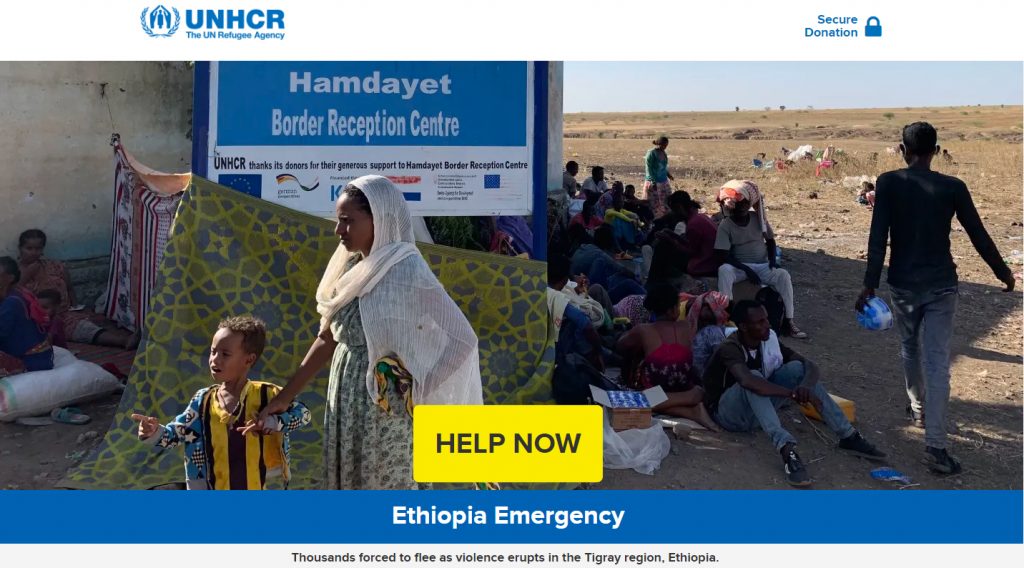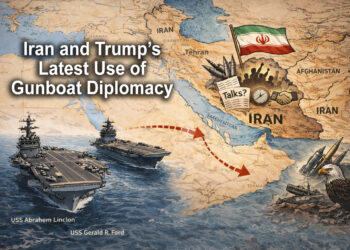by Miceál O’Hurley
DUBLIN – For over a quarter of a century, Ethiopia was ruled by the Tigray People’s Liberation Front (TPLF). Tigray, a semi-autonomous region in the north of Ethiopia, borders Eritrea. Tensions along that border led Ethiopia’s ruling TPLF party to wage a lengthy war with Eritrea. Despite an International arbitration decision largely in favour of Eritrea, the TPLF refused to commit Ethiopia to peace. In 2018, elections swept the TPLF from power and saw the new Prime Minister, Abiy Ahmed Ali, build a national coalition of Ethiopia’s many ethnic factions while brining an end to the decades old conflict with Eritrea. In the process, his efforts for peace earned Aiby the 2019 Nobel Peace Prize in the process.
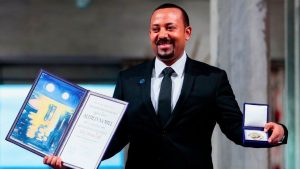
The rise of Abiy is perceived to represent the Ethiopian people’s desired break from the historically repressive TPLF rule. Ethiopia is one of the Horn of Africa’s most powerful governments. Abiy broke with the tradition of heavy-handed governance and welcomed home exiled opposition figures. Abiy declared fairly extensive amnesty for political prisioners, released many from prison, including many under a sentence of death from the previous TPLF regime.
Abiy’s efforts to broker peace, stabilise the region and focus on both political and domestic reform, the rule of law and normalising internal markets to improve Ethiopia’s standard of living across ethnic lines won him praise both at home and abroad. In 2018, Abiy made his first trip to the United States, which enjoys a large and historic Ethiopian diaspora, and was met with large and enthusiastic crowds. Unlike many other African leaders, Abiy has enjoyed significant success in not only stemming the ‘brain drain’ that plagues Africa of its best and brightest, but saw a return of many whom had emigrated. The nascent fruits of inward investment soon followed. The son of an interfaith union between a Muslim and a Christian, with diverse ethnic heritage, Abiy is perceived as being a unifier of the Ethiopians as well as the region, offering a model for stability and good governance in the to often troubled African Horn.
Foundations of the Conflict
After decades of unchecked power, many TPLF leaders faced corruption charges with more of their party members being replaced in office. For their part, the TPLF accused the new coalition Government of committing political retribution. Despite all other national party’s joining the grand coalition, the TPLF refused to engage in a unity government. In early 2020, Tigray defied a Government imposed national Covid-19 lockdown and decided to hold their own elections. Citing the Constitution, Addis Ababa refused to recognise the legitimacy of Tigray elections.
In the aftermath of the dispute, the Tigray region’s leaders ceased to recognise the democratically elected Government of Prime Minister Abiy in Addis Ababa. Since then, Tigray has been waging an increasingly deadly assault on Government authority, killing hundreds of civilians in the process. The Tigray government, which maintains multiple militia forces, as well as a well-trained and equipped army, has often been condemned as “repressive and regressive.” Tigray forces have not only attacked Government forces and their fellow Ethiopians but have renewed military assaults on neighbouring Eritrea with the hope of reviving the now settled conflict. To date, Asmara has shown remarkable restraint in not holding Addis Ababa responsible for the Tigray region’s attempts to pull both Ethiopia and Eritrea back into the conflict of the past.
Shocking Violence and Fears of Ethnic Reprisals, Targeted Ethnic Attacks
In early November, Tigray insurgents led an attack on their fellow Ethiopians, reportedly killing more than 600 men, women and children in a single attack. In its preliminary report into the 9 November massacre at Mai-Kadra, a town in the Tigray region, the Ethiopian Human Rights Commission (EHRC) said an informal group of Tigrayan youths, aided by local officials and police, “carried out door-to-door” raids, killing hundreds they identified as ethnic “Amharas and Wolkait.” Fears of ethnic cleansing attempted by Tigrayan insurgents have driven a refugee crisis as civilians attempt to flee the human carnage.
The EHRC, an NGO which describes itself as an “independent national” body, accused the Tigrayan youth, who were aided by local militia and police security, of committing “war crimes” and “crimes against humanity” before the attackers hastily retreated from the advance of the Ethiopian Defense Forces (EDF). “The unimaginably atrocious crime committed against civilians for no reason other than their ethnicity is heartbreaking,” said EHRC chief Daniel Bekele in a statement. “It is now an urgent priority that victims are provided redress and rehabilitation, and that perpetrators involved directly or indirectly at all levels are held to account before the law.”
Multidimensional Humanitarian Crisis Destabilising Region
Intense fighting erupted on 4 November, creating a massive humanitarian crisis for Ethiopia and its neighbours. There are unconfirmed reports of more than 100,000 refugees having fled the insurgency while Addis Ababa attempts to reassert control over the region. Neighbouring Sudan, already struggling under the devastating humanitarian crisis brought on by Covid-19, has been thrown into deeper crisis, overwhelming their ability to cope with the chaos and suffering. To make matters worse, an overwhelming locust outbreak, the most catastrophic in decades, is ravaging crops and creating even greater food insecurity in the midst of both a pandemic and a raging insurgency.
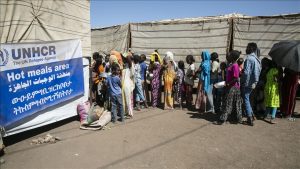
The UNHCR, the UN’s refugee relief agency, is attempting to stem the tide of misery. Following violent clashes between Ethiopia’s federal forces and Tigrayan insurgent forces, civilians in the Tigray region of Ethiopia are in crisis. Communication networks are down, banking services are halted, roads are blocked and there are shortages of basic supplies.
Fearing for their lives and the lives of their families, thousands of children, women and men have been forced to flee into Sudan. According to a UNHCR appeal, the situation is expected to further decay, stating, “We urgently need to scale up our supplies so that we are ready to respond as the situation worsens.” UNHCR reports, “More than 30,000 refugees have arrived in Sudan exhausted and scared and are being sheltered in transit centres near the border. Water and meals are being provided and UNHCR and the Sudanese authorities are working around the clock to set up a new refugee site to shelter them.”
Most of the refugees arriving in Sudan are children and women who walked long distances on rugged terrain to reach safety. They arrive exhausted, hungry and thirsty, having had to cross a river by boat or in some cases by swimming. The river, known as the Tekeze in Ethiopia and the Setit in Sudan, divides the eastern Sudanese areas of Lugdi and Hamdayet.
More than 5,000 refugees arrived in Sudan’s border provinces of Kassala and al-Qadarif last Sunday, the highest single-day number of arrivals since the start of the conflict in Tigray earlier this month, the UNHCR said. Officials said last week they expected up to 200,000 refugees to enter Sudan.
Regional Stability Threatened
However, fighting has spilled beyond Ethiopia’s borders, threatening to inflame the Horn of Africa region. Asmara’s discipline in not yet placing blame on Addis Ababa has been instrumental in the two nations cooperating to keep the entire region from being thrown into all out conflict. How long Eritrea might maintain its patience is unknown. Stability hangs in the balance.
Insights from the Ethiopian Ambassador to Ireland, His Excellency Mr. Eshetu Dessie Hordofa – an Interview with Miceál O’Hurley
Mr. Ambassador, I appreciate your time as I know you have been quite heavily engaged given the circumstances. Having been Speaker of the Oromia Regional State Council (parliament) before becoming Vice President of Oromia Regional State yourself, as well as serving the Government in Addis Ababa, you have a unique and informed perspective. I’m certain our readers will find your thoughts on these urgent matters insightful. I’d like to start with some background if I may.
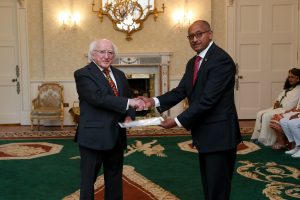
Eritrea and Ethiopia were locked in a protracted war in which an international arbitration commission ruled in favour of Eritrea in 2002. The previous Ethiopian Government, led by the Tigray People’s Liberation Front (TPLF), and during that time refused to accept the ruling resulting in 15 years of “no war, no peace,” continuing the prolonged suffering of both the Ethiopian and Eritrean peoples.
In 2018, Abiy Ahmed became Prime Minister and his Ethiopian People’s Revolutionary Democratic Front Chairman unified Ethiopia’s parties into a coalition known as
the Prosperity Party. The TPLF rejected this coalition before attempting to declare independence, instigating military aggression against the Federal Government and even resuming hostilities with its neighbour to the north, Eritrea. Is that a fair summary of the situation?
Yes, you have fairly summarised it but I would like to further elaborate some of the points. First, the international arbitration commission did not entirely rule in favour of Eritrea in 2002. Some of the contested areas were ruled in favour of Eritrea, while the remaining were ruled for Ethiopia. Second, the then government of Ethiopia had accepted the boundary commission’s decision in principle. However, Ethiopian government had proposed further negotiations on the practicality of the implementation of the decision of the arbitration commission. Because of lack of serious commitment from both sides to undertake negotiations, the two countries have forced to remain in “no war, no peace” situation over the last fifteen years. After ascending to power, Prime Minister Abiy dramatically broke the deadlock.
Prime Minister Dr. Abiy Ahmed had started his job of premiership at the beginning of April 2018. Since then he has undertaken a plethora of reform initiatives such as releasing prominent political leaders and journalists from prison, widely opened political space, invited exiled dissidents to come home and participate in the political process. He also introduced a multitude of political and economic reform agendas including merging ethnic based nine parties into a unified national party called Prosperity Party. Prime Minister Abiy has encouraged TPLF to join the new Prosperity Party.
TPLF had adamantly objected the formation of the Prosperity Party accusing it as a political force which has a plan to dismantle Ethiopian multinational federation exercised for the last thirty years. In reality, this was not true. Although it has pretended to portray itself as an adherent of multinational federation TPLF was not willing to include parties outside of its domain. Furthermore, TPLF had disproportionately dominated the federal government top positions and made the regional governments dysfunctional by overriding the self-rule rights enshrined in the constitution. So, the multinational federation was not exercised properly during the TPLF regime.
On the other hand, the Prosperity Party has formed as a merger of political parties that made up EPRDF and previously alienated five parties. TPLF is the only party that refused to join this coalition from former member parties of EPRDF. The fact that it would no longer take the dominant position that it enjoyed for over 27 years has become a bitter pill for TPLF to swallow. So, instead of peace, it has chosen all kinds of subversive tactics, including brazen lies and misinformation, to undermine the new Prosperity party. In concert with some violent political groups such as OLF, TPLF has also been inciting havoc in some parts of the country. The current war can be seen in this context of TPLF’s attempt to come back to power by force.
Prime Minister Abiy was awarded the Nobel Peace Prize last year for his efforts to end the long war with Eritrea. The TPLF had refused to make peace with Eritrea while previously in power. Now, they have opposed the Government at almost every turn since the start of 2020.
Is there any hope that Abiy might be successful in brokering peace with the TPLF to reduce the bloodshed that has seen both Government and TPLF fighters, as well as civilians, killed in alarming numbers in recent weeks?
The Government of Ethiopia has great commitment to foster peace and reconciliation. It was also engaged in ensuring the rule of law, while advocating peace, reconciliation and healing to many of our ailments as a nation. As a symbol of its commitment to peace and reconciliation in Ethiopia, the government established a new Ministry of Peace and set up a new Peace and Reconciliation Commission. Not only that, but the Ethiopian Government was also working for economic integration and stability of East African countries.
Prime Minister Abiy was awarded the Nobel Peace prize for his incredible achievement to end twenty years of “no war, no peace” deadlock between Ethiopia and Eritrea. Despite the TPLF’s persistent effort to destabilise Ethiopia and its attempt to reverse the reform initiatives, the Government has been patiently and positively engaging with them over the last two years. Unfortunately, they took the Government’s patience and restraint as a sign of weakness and vigorously continued destabilising the country.
Finally, the TPLF attacked the Northern military base which has been stationed in the Tigray region for the last twenty years protecting the people of the region from any threat. The TPLF had crossed the red line by attacking the national defense force so that the government was forced to start law enforcement operations to protect national sovereignty.
What do you have to say to critics who would urge Addis Ababa to be more patient and understanding of Tigray’s leaders?
What would the Sovereign Government of Ireland do if County Kildare’s public representatives build militias and Special Forces and attack the headquarters of the Ministry of Defense in Newbridge? Would it negotiate with them? The TPLF has done exactly that.
It attacked the national army and, in the process, put the lives of millions at risk so as to gain power by any means. It has held the people of Tigray and Ethiopians as hostages. Would any self-respecting nation negotiate with such a group? The Ethiopian Government tried hard not to be dragged into this senseless war. But, the TPLF is no ordinary political group, they are an organised mafia.
In light this Government has been undertaking relentless efforts to resolve the dispute peacefully over the past two years but TPLF refused to accept a peaceful resolution. The last resort after all peaceful means attempted is to use military force to remove this hostile and rogue group, otherwise, the sovereignty and national integrity of the nation will be in question. The law enforcement operation will be short and effective. Moreover, the operation will be conducted carefully and in a selective manner to minimise civilian casualties.
Ethiopia’s Federal Government is comprised of 10 regional districts, largely drawn along ethnic lines, that are semi-autonomous. With Abiy cancelling the regional elections in Tigray because of the Covid-19 outbreak, Tigrayans proceeded to hold elections anyway, claiming it was their right as a semi-autonomous region. I believe Abiy has declared that the Government would not accept the outcome of these non-sanctioned elections, despite the presence of international election observers. Tigray now claims they no longer recognise the legitimacy of the Government in Addis Ababa.
Has this conflict between the Governing coalition led by Prime Minister Abiy and the TPLF brought the nation to what is tantamount to civil war or is this simply a regional insurgency that has gotten out-of-control?
First of all, it is not Prime Minster Abiy that cancelled the regional elections because of COVID-19. Figures from independent groups and constitutional experts advised that the elections should be postponed until further notice since the situation was not conducive to run free and fair elections without putting millions of election officials and the public at risk.
COVID-19 is an international health risk and the Government has a responsibility to protect the safety of its citizens. The TPLF knew that elections were postponed temporarily, and not forever. Furthermore, they were the governing party in Tigray at the time and it was not as if their power in Tigray was at risk. Out of the 10 regional states in the Federation, only Tigray, ruled by the TPLF, rejected the constitutional court’s decision. This was not about elections – it was simply the TPLF taking every opportunity to undermine the constitution of the land.
The TPLF have this narrative that if they are not leading, then Ethiopia will cease to exist. They just wanted to prove that the Prosperity Party, or any other party for that matter other than the TPLF, cannot govern Ethiopia. But it did not go as they wanted. They miscalculated and undermined the same democracy and Constitution for which they claim to fight.
I have pointedly used the term insurgency today because I am struggling to see that this is, as some might claim, a ‘civil war’. Given the broad, democratic, political unity expressed in the Government from all of the other regions and ethnicities in Ethiopia, could this be characterised as being tantamount to a civil war?
This is not a civil war. It is a short-term military operation aimed to remove the belligerent TPLF criminal group. In our country regional governments have no constitutional and legal mandate to undertake election. Managing the election process is the mandate of the National Election Board. So, the election they conducted is illegal, null and void. The government is engaging in military operations not because of the Tigray election but because of the TPLF attack on our defense command stationed in Tigray.
What then is Addis Ababa’s goal in undertaking these operations?
The deployment of FDRE Defense Forces in the National Regional State of Tigray is aimed at restoring constitutional order, ensuring rule of law in the region by putting an end to impunity and illegal activities that endangered the Constitution and Constitutional order. It is not a civil war, rather it is an operation to ensure rule of law and the full implementation of the Constitution of FDRE.
Tigray’s leaders and former members of the ruling Government claim they have been unfairly targeted for prosecution for corruption, summarily removed from leadership positions, reduced funding to the Tigray region and made scapegoats for Ethiopia’s woes. Is this a case of the opposition now having risen to power visiting political retribution on their opponents or is this, as the Government suggests, necessary reform and application of the rule of law?
The TPLF dominated Ethiopian politics for 27 years. In those years, its members occupied all the highest echelons of power in the country. Corruption was rampant and they siphoned billions of dollars. One of the reasons Prime Minister Abiy came to power in 2018 was to uproot corruption. Those who abused their power and enriched themselves by stealing from the nation have been convicted. It has nothing to do with ethnic background.
The Government cannot simply ignore the culprits just because they belong to the TPLF. The rule of law has to be applied to everyone equally – TPLF members or others. That is what has been happening.
Irrespective of their ethnic background, former officials of the government were removed from power and those who were suspected of human right abuse and corruption have also been convicted. The claim that former Federal Government officials especially ethnic background of Tigray is targeted is a baseless false accusation. It was TPLF who has called all government officials and parliament members to resign from their position. In short, the federal government did not have an intention to marginalise the TPLF.
The federal government funding support for Tigray region was not reduced, on the other hand the criminal group stationed in Tigray has found to be diverting the development budget support by federal government to train Special Forces and militia to wage war and to finance violence and havoc in different part of the country.
Tigray’s leaders claim the Government is driving this conflict, concocting a false narrative to justify its deployment of military forces against the Tigray minority. Is the Government justified in the use of military force in the Tigray region and will it restore order or only serve to foment an ongoing conflict which has ethnic overtones?
The Federal Government has tolerated the TPLF actions of destabilising the country over the past two years and had no intention to fight with TPLF. Despite multiple havocs caused by the TPLF in different parts of the country, the government has been working hard to engage them to resolve the issues peacefully. TPLF has been orchestrating conflicts in which many civilians have been savagely killed in some parts of the country, despite the government’s call for peaceful engagement. The government has worked relentlessly to avoid any conflict with TPLF over the last two years but there was vivid evidence that the TPLF was the one who have been continuously fomenting violence. TPLF criminal elements are hell bent on fomenting violence to undermine Prime Minister Abiy’s administration.
As mentioned earlier, in addition to the multiple provocations that have undertaken to reverse the reform initiatives started by the Prime Minister two years ago, TPLF crossed redline when they attacked the Northern military base command forces stationed in Tigray for more than twenty years. TPLF leaders openly admitted that they started the war by attacking Northern Military Base. TPLF’s high command member ‘Sekoture Getachew’ in his televised speech admitted the attack by saying a ‘rapid and speedy’ attack has been conducted so as to have control over the base and the weapons. Their actions during this meaningless war (firing rockets at cities including neighboring countries) also clearly tell the nature of the mafia group the Government is dealing with.
The operation being undertaken by the government has no relation with any ethnicity but only focused on law enforcement.
Eritrea claims that missiles and artillery attacks have been deployed against them from the Tigray region by local insurgents. Do attacks by Tigray against their old foe Tigray, while Tigray simultaneously conducts military operations against the Government in Addis Ababa, endanger the peace between Ethiopia and Eritrea which Prime Minister Abiy brokered and for which he won the Nobel Peace Prize?
As you mentioned, TPLF has deployed rockets and attacked Asmara airport with the sole purpose of exporting conflict to neighboring countries. We strongly believe that the TPLF attacks on the Eritrean government will not endanger the peace process started between Eritrea and Ethiopia because the Eritrean government understands the reasons why they are continuously doing this provocation. One of the reasons for this is to deceive the international communities that Eritrea is involved in the military operation. The second reason is to get support from Tigrayans for their unjustified war. But, Eritrea showed its resilience and commitment to peace by not retaliating to the TPLF attack.
The ‘Horn of Africa’ has long been a fragile region, prone to armed conflict, hunger and almost non-ending humanitarian crisis. What impact do you think this conflict between Addis Ababa and Tigray might have on your neighbours in Somalia, Eritrea, Djibouti and Sudan?
TPLF has attempted to internationalise conflicts by launching rockets to attack Eritrean airport but the Eritrean government did not retaliate. Ethiopian government will complete the military operation in Tigray in a very short time as well as try to contain the conflict from expanding to the neighboring countries.
As you rightly mentioned, the Horn of Africa is a fragile region prone to natural and man-made crisis. Unless peace, security, law and order are restored in the Tigray Regional State, there will be a risk of exporting conflict to neighboring countries. One of the reasons why Ethiopian government is forced to pursue military operation in the Tigray region is aimed at guaranteeing peace and stability, ensuring constitutional law and order as well as to put an end to criminal activities once and for all to eliminate the risk of this criminal group exporting conflicts to neighboring countries.
As with any armed conflict, there is a heavy price to be paid by the civilian population. With the Covid-19 pandemic already exacting a significant toll on the civilian population, and now with a hot conflict raging, how would you describe the growing humanitarian crisis in Ethiopia, including the displaced persons and refugee problems it has created?
It is unfortunate that innocent civilians are caught up in this conflict that is instigated by the TPLF. By initiating this war the TPLF is causing harm to the very people it is claiming to fight for. The Government of Ethiopia and the National Defense Forces are putting maximum effort to minimise civilian casualties. Unlike TPLF that fires rockets to densely populated cities, our Defense Forces have been striking weapons caches and target areas. Our defense forces have a time refrain from taking actions against high value targets when these are too close to civilian areas. However, there is nothing good about conflict. We are trying our best to restore peace in many of the areas that are liberated from TPLF’s rule, as promised, military operations are coming to conclusion swiftly.
The government is doing its best to resettle civilians who fled the conflict. We are also calling the international community to support the civilian population and help to bring back displaced citizens to their homes. Preparations are underway to resettle the population and to restore normalcy.
The government has limited military operations that do not cause colossal damage to the civilian people. Several civilians such women, children and old people are also fleeing to Sudan fearing the virulent conflict. The defense force is playing crucial roles in restoring transitional administration in areas liberated from TPLF. The government is also calling on the international community to support the civilian population and help to bring back displaced citizens to their home villages. Preparations are underway to resettle the population and to restore normalcy.
Prime Minister Abiy has promised a swift end to hostilities to bring the Tigray region under control and reestablish stability. Do you have a timeline for when we might see an end to military operations and a transition to a less bellicose posture in Tigray?
The law order enforcement operations in Tigray region will be accomplished in very short time as soon as the criminals are disarmed, legitimate administration is restored, and fugitives apprehended and brought to justice. The government is working effectively to finish the operation in a few weeks. The transition will also be done smoothly through continuously consulting the people of Tigray. So far, everything has been going as planned.
What do you see happening in terms of reconciliation and reintegration once military operations have ended?
The government has designed several activities to end hostilities and stabilise the region. Leaders of transitional administration in Tigray have been already assigned to start ground works to quickly jump into providing humanitarian assistances for needy civilians. Communities, resettling displaced people, disarming militias and Special Forces, rebuilding the infrastructures which were destroyed by TPLF armed forces as well as to start providing basic public services.
Ultimately, Tigrayans, along with the rest of other Ethiopians, will have a chance to elect their own administration when the national elections are held in a couple of months’ time.
Your Excellency, I know you have other pressing commitments. Please allow me to express my gratitude for you taking time to speak with us and share your insights. I think I speak for everyone when I express our best hopes for those affected by war including the displaced persons and refugees. I look forward to us continuing our conversations.
Thank you, Miceál.
Special Appeal
You can help alleviate the suffering in the region by making a donation to the UNHCR today by clicking the image below:
For further news of Ireland’s diplomatic corps, please Like us on Facebook, Follow us on Twitter and visit our web site at diplomacyireland.eu for continuing coverage.


































